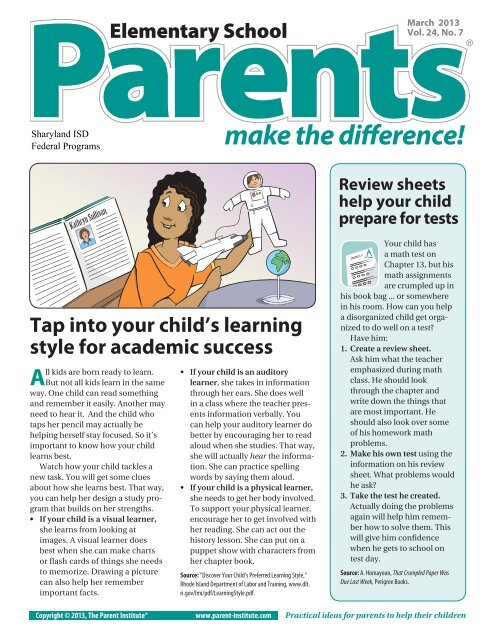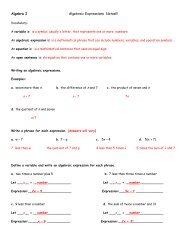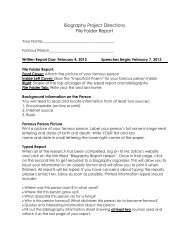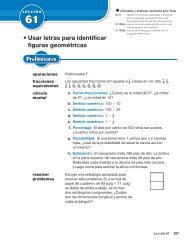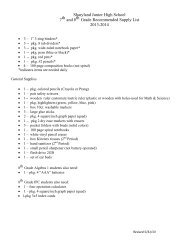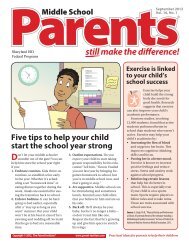Parents make the difference!® (Elementary School ... - Sharyland ISD
Parents make the difference!® (Elementary School ... - Sharyland ISD
Parents make the difference!® (Elementary School ... - Sharyland ISD
Create successful ePaper yourself
Turn your PDF publications into a flip-book with our unique Google optimized e-Paper software.
www.parent-institute.comSet <strong>the</strong> stage for a successfultransition to middle schoolIf your child willgraduate fromelementary school thisyear, congratulations!The move to middleschool is exciting and rewarding—and will be easier by preparing now.At school, teachers are alreadygetting students ready for this bigtransition. At home, you should do<strong>the</strong> same thing. After all, researchshows <strong>the</strong>re’s a strong connectionbetween parent involvement andstudent success!To support your child’s progressand independence:• Learn about <strong>the</strong> middle schoolahead of time. Visit <strong>the</strong> school.Read its website regularly. Ask fora tour. The more comfortable youand your child are at <strong>the</strong> school,<strong>the</strong> easier it will be to adjust.• Build school spirit. Learn about<strong>the</strong> school’s clubs, teams, classes,colors and mascot. Talk aboutIs your child being bullied?The time to take action is now!It’s hard to learn mathfacts if you’re worriedabout what’s going tohappen to you duringrecess. You can’t concentrateon reading skills if you’rethinking about <strong>the</strong> mean thingsomeone just said about you.Kids who are being bullied oftenstruggle in school. So if you suspectyour child may be a victim, here aresome tips:• Don’t wait. Although about half ofall kids are victims at one time orano<strong>the</strong>r, bullying has a real impacton a child. If you suspect something,talk with your child about it.your child’s interests. What excitingthings will he learn and do inmiddle school?• Encourage important habits.Your child should stick to a dailyhomework routine and practicestaying organized. These skills willbe critical in middle school andbeyond.• Ask for advice. Research summeractivities for rising middle schoolers,such as library reading programs.Ask <strong>the</strong> school for suggestionsbefore <strong>the</strong> school year ends.• Stay informed. Attend events fornew students and families. Join<strong>the</strong> parent-teacher organizationand ask about volunteer opportunities.Introduce yourself to staffand o<strong>the</strong>r parents.• Keep communicating. Talk withyour child about his concerns andhopes. Solve problems toge<strong>the</strong>r.When middle school begins, keepin touch with teachers, too.• Learn as much as you can. Askyour child who she sits with atlunch. Who does she play with atrecess?• Teach her how to respond. Helpher practice saying somethinglike, “That’s bullying and I wantyou to stop.” If she can, have herstick with friends. It’s harder topick on a whole group.• Contact <strong>the</strong> school. Let <strong>the</strong>teacher know what’s going on.Bullies often wait until <strong>the</strong>y areaway from adults to take action.• Boost her self-esteem. Get herinvolved in activities that <strong>make</strong>her feel good about herself.Copyright © 2013, The Parent Institute®Q: I am a single parent and I workfull-time. My fifth grader is askingfor a cell phone. I must admitI would feel better if I knew hecould reach me in a crisis. Still, achild in fifth grade seems reallyyoung for a phone. What do o<strong>the</strong>rparents do?Questions & AnswersA: For those who remember <strong>the</strong>days when a family had one phone(and it was wired to <strong>the</strong> wall),today’s cell phone culture can beunnerving. But more than onethirdof kids in elementary schoolalready have cell phones.The key is to decide whe<strong>the</strong>ryour son needs a phone, whe<strong>the</strong>rhe can handle <strong>the</strong> responsibility,and whe<strong>the</strong>r it will work for yourfamily.Ask <strong>the</strong>se questions:• Why might he need a phone?Safety is a big reason manyparents want <strong>the</strong>ir child connected.You might want yourchild to reach you if <strong>the</strong>re’s aproblem. Remember, <strong>the</strong>reare different kinds of phones—you could get one that is onlyprogrammed to call a fewnumbers, including yours.• What are <strong>the</strong> school rulesregarding cell phones? Manyschools do not allow cell phonesto be turned on during <strong>the</strong> day.They’re just too distracting forlearners. Be sure your child iswilling to follow <strong>the</strong> school rules.• What limits will you set? Howmuch can your child talk? Towhom? Is he prepared to haveyou check his phone to read histext messages? What happens ifhis minutes go over <strong>the</strong> limit fora month?—Kris Amundson,The Parent InstituteMarch 2013 • <strong>Elementary</strong> • <strong>Parents</strong> <strong>make</strong> <strong>the</strong> <strong>difference</strong>! • 3
Copyright © 2013, The Parent Institute®Strategies canimprove readingcomprehensionReading helps kids gainknowledge throughoutschool and life. Andhow your child reads<strong>make</strong>s a big <strong>difference</strong>.Students need to persevere—evenif reading is difficult—and thinkabout what <strong>the</strong>y read.Encourage your child to:• Prepare. Before reading, yourchild should scan <strong>the</strong> material.What does she think it will beabout? What does she hope tolearn from it?• Ask questions. While your childis reading, she should ask herselfquestions such as, “Do I understandthis?” “What is it about?”“What happened?”• Solve problems. If your childdoesn’t understand a word,sentence or concept, sheshouldn’t give up. Rereadinghelps. So does sounding outwords. <strong>Parents</strong> and teachers canoffer hints, too.• Summarize. After reading, yourchild can <strong>make</strong> a “map.” Write<strong>the</strong> story’s title and surround itwith five circles. In each one, fillout <strong>the</strong> who, what, when, whereand why of <strong>the</strong> story.• Test herself. She can use reviewquestions at <strong>the</strong> end of chaptersto reinforce information. She caneven <strong>make</strong> her own practice test.• Discuss readings. Quiz eacho<strong>the</strong>r on facts—and shareopinions, too. “Did you like <strong>the</strong>ending?” “Why or why not?”“What was your favorite part?”Source: J. Light and D. McNaughton, “Reading Comprehension,”Penn State Literacy Instruction, http://tinyurl.com/d329zrd.It Matters: ReadingResearch shows <strong>the</strong>re arecertain skills children mustlearn for reading success. Teacherswork on <strong>the</strong>m at school, but i<strong>the</strong>lps to practice <strong>the</strong>m at home,too. They include:1. Recognizing and using sounds.Talk about how words are madeof parts. Separate <strong>the</strong>m intopieces. For example, bat is madeof “bbb,” “aaa” and “ttt.”2. Understanding that lettersrepresent sounds. Look atprinted letters. Name <strong>the</strong>irsounds. Also notice pairs andgroups of letters, such as br.What sounds do <strong>the</strong> two letters<strong>make</strong> toge<strong>the</strong>r?3. Knowing a lot of words. Themore words your child knows,<strong>the</strong> more he’ll recognize andcomprehend. Try to use newwords often—and repeatedly.Make sure <strong>the</strong>ir meaning is clear.Experts believe allkids can enjoy reading.It’s just a matter of finding<strong>the</strong> right materials.Before your next libraryvisit, brainstorm about:• Your child’s hobbies. She mightfind an irresistible book aboutsoccer, video games or cooking.Ask <strong>the</strong> librarian for suggestions.• Types of materials. Would yourchild like a mystery? A how-tobook? A biography? Considereverything!www.parent-institute.comResearch identifies five readingskills you can teach at home4. Using comprehension strategies.This involves thinking aboutreading materials. Ask your child,“What is <strong>the</strong> story about?” “Canyou retell it in your own words?”5. Reading quickly and correctly.Learning this skill takes time! Themore experience your child haswith reading, <strong>the</strong> easier this willbecome. Simply reading toge<strong>the</strong>rwill <strong>make</strong> a big <strong>difference</strong>!Source: “The Five Essential Components of Reading,” U.S.Department of Education, www2.ed.gov/parents/read/resources/readingtips/part_pg5.html.Take a trip to <strong>the</strong> library totransform a reluctant reader• Activities. See if your locallibrary hosts read-aloud times,or has reading-related computergames for kids.• Company. Kids who “don’tlike” to read often take pride inreading to o<strong>the</strong>rs. Bring along ayounger sibling, a grandparent,or a favorite stuffed animal.• Alternatives to books. Yourchild might prefer shortermaterials, such as articles,comics or recipes. All of <strong>the</strong>secount as reading!4 • <strong>Elementary</strong> • <strong>Parents</strong> <strong>make</strong> <strong>the</strong> <strong>difference</strong>! • March 2013


